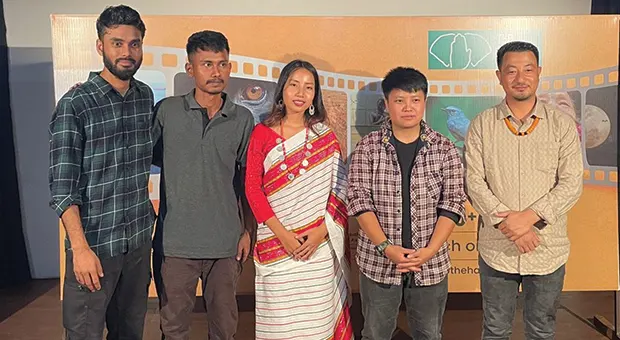[ Indu Chukhu ]
GUWAHATI, 19 Nov: Short films from the Northeastern states, produced by the Habitat Trust in collaboration with Dusty Foot Productions, were screened earlier last week in Guwahati as part of a series of 50 films made by filmmakers from the region.
All of the filmmakers are alumni of the Green Hub.
The short films screened included The Last Honey Hunter: In Pursuit of the Cliff Bee, Khapa: The Song of the Noctes, Bonaji (which focuses on traditional medicine practiced in Tripura), The Golden Thread (a short film about silkworms from Assam), and Raimona: The Paradise Unexplored (the first film shot in the newly created Raimona National Park in the Bodoland Territorial Council of Kokrajhar district, Assam). Raimona was declared a national park on June 5, 2021, by Assam’s Chief Minister Himanta Biswa Sarma.
Khapa Songs is a traditional folk song of the Nocte tribe from Tirap district, sung during the Chalo Loku festival. It is considered incomplete without the song, which is interestingly performed by men. The lyrics of Khapa Songs encourage youth to follow the right path. Assistant cameraperson and film editor Sara Khongsai, who was present at the screening, explained that the lyrics are often difficult to understand and even harder to learn, even for native Noctes. The film was made to preserve this important cultural heritage.
The Khapa Songs film is directed by photographer and conservation practitioner Chajo Lowang from Tirap district. Sara shared that the film was shot in Borduria village, where only one Khapa singer remains. The lone singer hopes the village’s youth will come to him to learn and carry on this tradition.
Rushikesh Chavan, head of the Habitat Trust, stated that for the past six years, the trust has been addressing challenges related to biodiversity laws, climate change, and water-related issues. He emphasized the importance of finding solutions to these complex issues, as they affect not only the air we breathe but also economic opportunities. The goal is to maintain the ecological functionality of natural ecosystems for a thriving world, which is the motto of the Habitat Trust.
Chavan also shared that the Habitat Trust works on terrestrial ecosystems, forests, wetlands, grasslands, marine areas, and in the technological space, developing innovative solutions for complex problems. The trust also works with communities to promote behavioral change and policies, collaborating with schools to build awareness among children. Over the past six years, the Habitat Trust has produced 190 films.
The Northeast series, created by the youth of the region, captures not only the biodiversity of the area but also its dying traditions. The series consists of 50 films in 22 dialects of the region. The Habitat Trust highlighted that no other series has previously focused so extensively on both culture and biodiversity. It aims to provide a platform for the youth of the Northeast to pursue their passion and share the essence of the region. Each film is between 3 and 7 minutes long, showcasing creative work.
The series aims to raise awareness among the general public, as much of this knowledge has only been accessible to researchers. The goal is to bring these films into every household in the Northeast, instilling pride in the region.
Imrana Khan, director of Dusty Foot Productions and one of the executive producers of the Stories from the Ground series, noted that these films are made by Green Hub fellows, who are youth from the Northeast telling their own stories in their native languages and dialects. She described working with these young filmmakers as a special experience, as she has seen them grow into professional filmmakers.
Khan further explained, “This series brings many great stories from the ground, deeply connected with their knowledge, community beliefs, and culture.”
Karabi Jamatia, a filmmaker from Tripura who created the short film Bonaji, explained that the film follows a woman (the protagonist) who makes traditional medicine, highlighting her knowledge of a specific disease called Dokholi in Tripura. This disease affects the body in 12 different ways and is treated using 12 different medicinal plants. Jamatia explained that due to the widespread practice of rubber monoculture in Tripura, natural forests are being destroyed, leading to the decline of these valuable medicinal plants. While not everyone can master the skill of identifying these plants, the medicine woman wishes to pass on her knowledge to the younger generation.
Chentei Khiamniungan, a documentary filmmaker and Green Hub alumnus, showcased The Last Honey Hunter of Wui Village from Noklak District, Nagaland. He explained that the film, shot in 2020, highlights the last surviving honey hunters and the vanishing culture associated with it. Khiamniungan added that the main objective of the film is to revive and preserve this tradition and to strengthen the connection between people and nature. The film will be taken back to the community for dialogue and knowledge exchange.
Gaurab Talukdar from Assam worked on Raimona: The Paradise Unexplored, focusing on the species, wildlife, and diverse forests of the newly established Raimona National Park in Kokrajhar District, Bodoland Territorial Council, Assam.
Rita Banerji, founder of Dusty Foot Productions and the Green Hub, was also present at the event.




